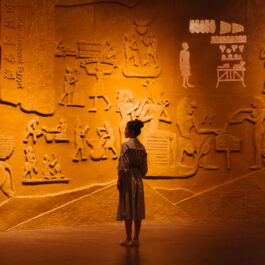Each month, American Express Essentials highlights one definitive literary work, old or new, and across any and all genres. The only determinant is quality: a book that makes life more vivid, more inspiring – a gifted piece of work you want to share. An absolute must-read.
Up this month is a best-seller, a crowd-pleaser and an inspiring meditation on creativity: musical producer Rick Rubin’s The Creative Act: A Way of Being, an exploration of the creative being.
We’ll get right down to it: Rick Rubin’s The Creative Act: A Way of Being is a must-read for anyone seeking to enrich their creativity and expand their perspective on artistry. From the outset, Rubin asserts that “creativity is not a rare ability. It is not difficult to access. Creativity is a fundamental aspect of being human. It’s our birthright, and it’s for all of us.” Indeed, his book stands as a remarkably accessible treatise that has, unsurprisingly, garnered widespread acclaim.
Rubin is of course no stranger to the act of creation. As co-founder of Def Jam Recordings, he boasts a career radiating with musical triumphs, including the production of iconic tracks such as Run DMC’s “Walk This Way” (featuring Aerosmith), Jay-Z’s “99 Problems”, and Adele’s “Rolling in the Deep”. In The Creative Act, Rubin seamlessly distils this wealth of experience into a narrative that will resonate not only with seasoned artists, but also speak to those venturing into the realm of creativity for the first time. The allure of his insights extends beyond the confines of his musical expertise, offering a holistic understanding of creativity as an innate human trait awaiting discovery and cultivation.
As a beacon for those navigating the intricate landscape of artistic expression, Rubin’s work serves as a testament to the universal accessibility of creativity, illuminating the path toward unlocking one’s creative potential and fostering an appreciation for the artist’s journey. It’s refreshing to see an author – especially one as successful as Rubin – situating himself, in a way, against the conventional ownership of art.
Rubin’s exploration of the creative realm extends beyond a mere understanding of the process: he expresses outright reverence for artistic endeavours. With solemn quasi-religiosity, Rubin elevates art to the highest echelons of human achievement, adopting a somewhat meditative approach that resonates throughout his work. He advocates for the respect, cultivation and nurturing of the creative force, urging his readers to approach both the act of creation and the resulting work of art with a sense of awe and recognition. Through his words, Rubin takes a transformative perspective that encourages a holistic and spiritual engagement with the creative process, elevating it to a sacred and revered space within the human experience.
However, The Creative Act, while rich in insight, may not satiate the appetite of readers seeking more substantial depth or concrete facts. Rubin openly acknowledges the subjective nature of his book from the start, emphasising that his reflections come exclusively from a lifetime of observations.
Unapologetically, the book avoids presenting one solid argument, functioning more like a collection of proverb-like, succinct observations on art, creativity and life itself. Regrettably, for readers who prefer more substance, it lacks the specificity that real-life examples or anecdotes could have provided, especially given Rubin’s abundance of experience. While one understands he might not want to name-drop, specific examples would have better illustrated a number of his points. Moving beyond the generalities may prove a hurdle for some readers.
That being said, The Creative Act will appeal to a wide audience, catering to the interests of anyone who is intrigued by the arts, regardless of their specific discipline – whether an actor, a musician or a painter, whether aspiring or accomplished, or perhaps simply someone exploring their artistic inclinations. Rubin’s insights extend beyond traditional genre boundaries, making every lesson applicable to a broad spectrum of readers – practically anyone looking to solve any problem in a creative manner.
The Creative Act invites readers to enter a liberated mindset, where the spectrum of possibilities is seemingly endless. While the book tends to hover in the realm of philosophy rather than concrete advice, there’s no denying that its greatest redeeming quality might just lie in its refusal to provide direct answers, instead offering a mosaic of ideas that ultimately allow readers the autonomy to pick and choose what resonates with their individual creative journey – and what doesn’t.
Further Reading
If you found inspiration in The Creative Act and are seeking to further enrich your journey of the mind, there’s no shortage of books to turn to. Thespians may benefit from The Actor and the Target by Declan Donnellan; aspiring authors should check out On Writing: A Memoir of the Craft by Stephen King; and visual artists might gain insight from Do It: The Compendium, a collection of essays by major contemporary artists, curated by Hans Ulrich Obrist.














Sorry, the comment form is closed at this time.